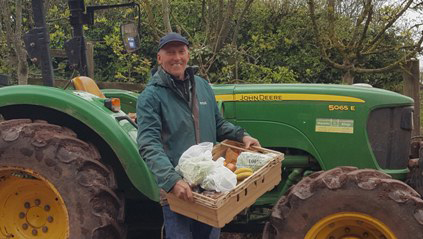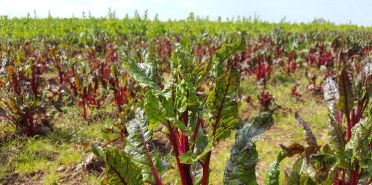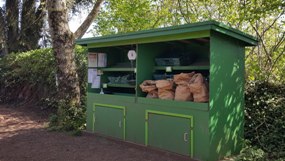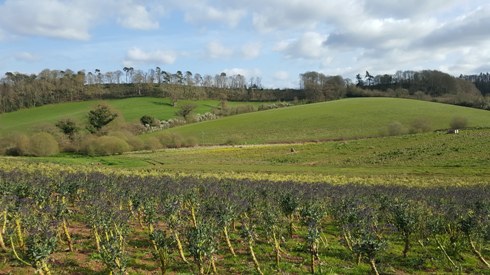Rising to the Covid-19 Crisis at Shillingford Organics
An interview with Martyn Bragg, the owner/ farmer
 Martyn Bragg has been farming organically on the outskirts of Exeter for the last 20 years. Horticultural produce from his farm is sold through his business, Shillingford Organics either directly to consumers or through wholesale to local enterprises. The major outlet for the farm’s produce is its award-winning vegetable box scheme and online shop. Over the last month, the vegetable box scheme has experienced an unprecedented increase in customers; the number of boxes sold each week has doubled. Like most food producers and processors, the business is experiencing a surge in demand due to the recent Covid-19 pandemic.
Martyn Bragg has been farming organically on the outskirts of Exeter for the last 20 years. Horticultural produce from his farm is sold through his business, Shillingford Organics either directly to consumers or through wholesale to local enterprises. The major outlet for the farm’s produce is its award-winning vegetable box scheme and online shop. Over the last month, the vegetable box scheme has experienced an unprecedented increase in customers; the number of boxes sold each week has doubled. Like most food producers and processors, the business is experiencing a surge in demand due to the recent Covid-19 pandemic.
PhD student, Becca McGowan from the School of Life Science's, Warwick Crop Centre speaks to Martyn to discuss how the business is rising to the challenge!
First of all, can you tell us a little more about what you grow and where you sell it? 
Within our 250 acres, we are currently using 40 acres to grow a large range of organic vegetables, salad and fruit. A lot of this produce is sold in our vegetable boxes which are sold all year round and 90% of their contents are grown on the farm. In our vegetable boxes and on our online shop, customers have the option to buy additional locally sourced produce such as organic milk, eggs, meat and bread. Boxes and online orders are delivered within a 6-mile radius of the farm. We also sell directly to customers at Exeter Farmers Market which is very popular. Through wholesale we sell to local shops, restaurants and other vegetable box schemes.
We are aware over the last month that your vegetable box orders have doubled…
Our box Scheme had been growing steadily, at the beginning of January, we were selling approximately 330 boxes a week, by mid-March this increased slightly to 360 boxes. Last week (week commencing 30th March) we sold 793 boxes!! On the 28th March we had to stop taking on new customers. And if looking at the amount people are buying, before the crisis struck, VPD (value per drop: the amount each customer spends on average) averaged £17. VPD is now £26!
 Are you still getting customers at Exeter Farmers Market?
Are you still getting customers at Exeter Farmers Market?
Whilst our box scheme customers have doubled, our farmers market sales have halved. We think that several of our farmers market customers have transitioned to using our box scheme so they can self-isolate or social distance.
Being within a mile of the outskirts of Exeter we have had a lot more people walking past the farm. We have an honesty stall on our lane and we are having to top up continuously.
How have sales changed through your wholesale platform?
Some customers such as restaurants and some shops have stopped ordering from us altogether. Yet, other shops and box schemes have doubled their orders. We are also having enquiries from businesses we did not supply before. A lot of these local companies are being very entrepreneurial and adapting to the new routes of supply and demand.
Can you give us an example of how local businesses are adapting?
A local organic salad producer had their sales stopped overnight because they sold to restaurants. On 22nd March they contacted us to ask if we wanted to buy some salad. Unfortunately, we had all the salad we needed. Just 6 hours later they contacted us again to say they had decided to set up their own vegetable box scheme and the following weekend they had 150 customers! To get 150 customers in the space of a week for a new ve getable box scheme is amazing! It would normally take about 2 years to build up that many customers. We had a surplus of leeks, spinach and beetroot, so we are supplying them with these.
getable box scheme is amazing! It would normally take about 2 years to build up that many customers. We had a surplus of leeks, spinach and beetroot, so we are supplying them with these.
The producer above is a relatively new start up on a small acreage of land. It is very hard for new starters to get into the market. Whilst this is an unsettling time, on the bright side it is providing the opportunity and demand to these new, young organic producers who have worked so hard to start up an enterprise and it highlights their adaptability and entrepreneurial ability.
There is a WhatsApp group set up by a group of small growers and producers in the South Hams who have set up a trading network between themselves. This is the sort of initiative that we need regionally to help make these producer/retailers as efficient and effective as possible.
Another friend who bakes bread, which we sell in our box scheme, has set up her own delivery scheme by cargo bike! She is being very enterprising to get her bread to her customers.
How is the surge in demand affecting your employees?
As a result of the increased demand, the employees are working a lot of extra hours. Each department has its own profit share, so they have a sense of gaining something from producing more at the moment. However, it has been a big challenge for everyone. Our packhouse and delivery team have been working 90-hour weeks.
Do you have enough produce?
We have enough produce to last till the end of April. The surge in demand has come at the wrong time. From the start of May we move into the ‘hungry gap’ when we will have less variety of produce to sell. We will have to source a lot more than usual from elsewhere or reduce the contents of our boxes. Just for the month of May we are often dependent on produce from Southern Europe to supplement the box contents. During the crisis will there be enough people in Spain to harvest it all?
We are also experiencing a shortage of supply ourselves. For example, our original supplier of organic eggs is inundated with orders. Our supplier of wholefood and household items were unable to deliver to us one week meaning we had to refund a lot of customers.
How are you adapting to keep up with the current demand?
We are thinking about buying our own flock of egg-laying chickens but there is currently a shortage of chickens too!
We are sowing and planting more than usual. We are just taking a punt at numbers. It is impossible to know what is going to happen in 6-12 months. Will we go back to our usual levels of demand? Will we go into a recession? Will people then not want to pay the “true cost” of food?
After the crisis is over, do you think you will keep your new customers?
Whilst a lot of our new customers are likely to be people who use our farmers market, I feel a lot of the new customers have chosen to order through us because they want a delivery whilst trying to self-isolate and social distance. They may not necessarily prioritise the purchase of organic produce or carry the ethical values of the farm when things are normal.
The glimmer of light is that people are more aware that there is a food supply issue. The majority of people get food off the shelf not thinking where it comes from. The food shortages are hopefully sparking questions of the origin of food.
